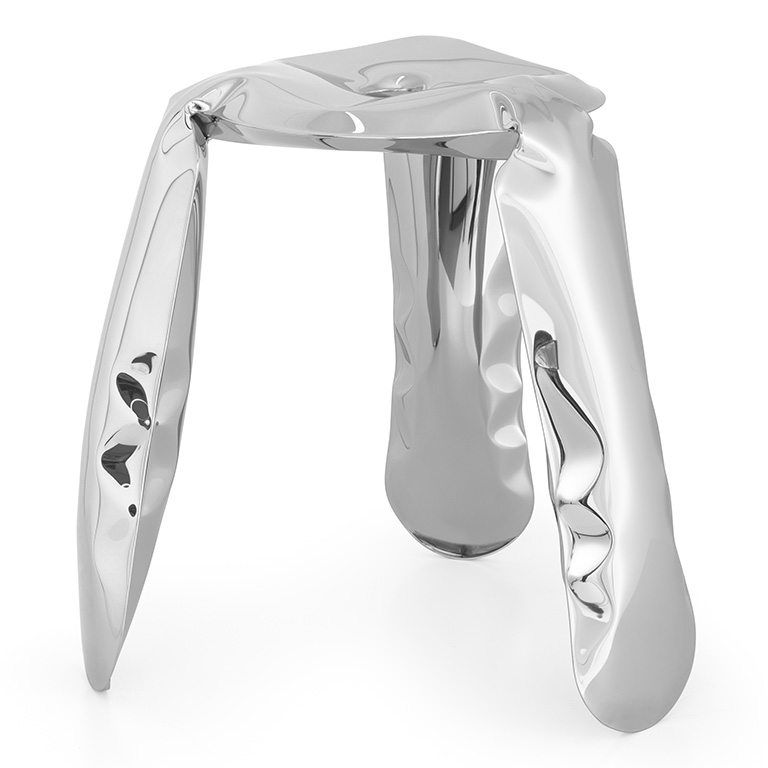A Polish and Swiss design team have perfected a method of creating inflatable steel furniture which could revolutionise the wind energy and construction sectors.
The designers – architect Oskar Zieta and materials scientist at the Swiss Federal Institute of Technology Phillipp Dohmen – created the engineering technique as a way of making steel-built products lighter and less expensive without compromising on strength.
Called free inner pressure deformation (FiDU), the technique requires laser cut sheets of steel that are precision shaped up to plus or minus 0.1mm of error. These 1mm-thin sheets of high-strength steel are then robot welded to ensure the utmost exactness of production.
Part of the furniture
The concept was initially tested with the manufacture of furniture, and Zieta Prozessdesign has a range of ladders, chairs and stools. The three-legged Plopp stools that Zieta designed are produced as rolled up tubes of thin steel sheet.
These can then be inflated via a simple valve to form a solid, lightweight and stylish seat. Due to steel’s inherent strength and the innovative FiDU technique, the award-winning Plopp stool can hold more than two tonnes.
As the pressurised air only needs to range between 0.1-50Bar, the furniture made using this method can even be inflated using a bicycle pump. Unlike existing hydroform methods used in the automotive sector, FiDU doesn’t rely on a mould to shape the steel during inflation so this can even be done at home.
Due to steel’s inherent strength and the innovative FiDU technique, the award-winning Plopp stool can hold more than two tonnes.
This means that the metal will deform as it inflates according to its natural characteristics, making each piece’s individual contours unique, even though they all come from the same identical design.
While the concept of flat-pack furniture changed the face of interior shopping forever, the FiDU method offers even more convenience at a fraction of the weight. Transporting even flat pack furniture takes up a lot of room, but uninflated Plopp stools take up almost no space compared with a fully formed piece. This has the knock on effect of significantly lowering costs and emissions associated with transport.
Dohmen says that the choice to go with steel was based on a number of factors. Strength was a key aspect, but accessibility and cost were also crucial. The design team experimented with other materials, but steel’s flexibility meant that it could be easily cold formed unlike aluminium.
 The FiDU technique has applications that range from infrastructure, to renewable energy, to space travel
The FiDU technique has applications that range from infrastructure, to renewable energy, to space travel
An inflatable steel future?
Dohmen sees opportunities that stretch far beyond furniture. With the design team’s experience in architecture, their research is focusing on construction and housing applications, with them seeing success in constructing a small bridge using an inflatable steel structure
The team have also designed and built a small wind turbine. Dohmen says many current wind turbine blades are made of plexiglass or carbon-fibre, with each two-metre-long blade costing €600. Steel blades made using FiDU, cost only €25 and have greater durability. The application of steel-built technology here could significantly lower the cost of adopting renewable wind power.
Dohmen and Zieta are developing a crash barrier that would run alongside highways. Unlike in other applications, these would be pressurised so that they offer the same deformation that current barriers exhibit, helping absorb impacts and keeping drivers safe.
Dohmen says this could be done with a fraction of the material, massively lowering the environmental footprint of the world’s highways.
It’s clear that this technology, powered by the qualities of steel, has the flexibility to the applied almost anywhere. Indeed, it is the inventor Zieta’s dream to utilise FiDU for constructions in space, where its ultra-light and compact design would make it uniquely suited.
Images: Zieta Prozessdesign